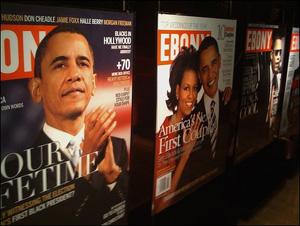African American media struggling to survive
Large, backlit reproductions of “Ebony” magazine covers in the front window of the publishers’ headquarters on Michigan Ave on election night. (Image: Flickr user JOE M500 (cc: by-nc-sa))
The following is not a full transcript; for full story, listen to audio.
Just like mainstream media, African American publications and media outlets are struggling. Fans of "Ebony" and "Jet" — two of the oldest black magazines — are urging friends not to cancel their subscriptions. But despite more than two million subscribers, owner Johnson Publications has had to mortgage its historic Chicago office building.
Minority broadcasters have asked the Treasury Secretary for what amounts to a temporary bailout, and in Massachusetts, the long-time African American newspaper "The Bay State Banner" closed until it received a bridge loan from the city of Boston. During that time, it missed one of the biggest race-based stories of the year: The arrest of Harvard Professor Henry Louis Gates Jr.
Kai Wright is senior writer for TheRoot.com, a webzine focused on black politics and culture published by the "Washington Post." TheRoot.com’s editor-in-chief happens to be Henry Louis Gates.
Wright believes part of the reason black media is struggling financially is due to advertisers shifting their shrinking advertising dollars from Black consumers to Latino consumers.
He says he is more concerned with the plight of local black publishers than black national media, "There’s these national publications that have been around now for years that everyone knows. Then there’s the local media … the local newspapers that have an equally vibrant history, but have been troubled for some time now, and I … believe they have an even more vital role in terms of the actual substantive thing that journalism has to offer to the world. They are the sorts of publications that are in the position to talk about things that don’t rise to the … national news, but are deeply relevant to the lives of black communities."
As for the roles that the national magazines like "Ebony" and "Jet" play in the African American community, Wright says they are cultural touchstones, but younger generations feel they are outdated, "They used to be … the only place on the national scale you could get everything from culture to society, where if you wanted to be an aspirational middle-class black person you could turn to … but they’re cultural touchstones … I’m 35 and folks my age and under quite often smear it … as outdated, old and crotchety."
Christopher Smith is communications professor at the University of Southern California. He thinks the national magazines are losing relevance because of the class divisions within the black community, as well as generational differences.
"’Ebony’ and ‘Jet’ really emerged in that post-World War II era when black Americans coming out of World War II were just beginning to feel a little bit that they could be a part of the mainstream. And ‘Ebony’ and ‘Jet’ spoke to that mainstream aspirational aspect, but now you have a whole post-affirmative action generation who now don’t really feel the need to pay homage to those touchstones the same way that previous generations did."
Wright believes younger generations aren’t interested in media with a narrow societal focus.
"I think that it’s clear that younger folks are not as interested in single-silo understandings of the world," said Wright. "So I think if you’re going to have a publication that is about race or is about the black experience in America, you need to approach that with less of a Black tool … people are less interested in having a single identity, a single perspective, a single experience — young folks are comfortable with multiple experiences, multiple walks of life."
As for whether mainstream media is adequately covering issues critical to the African American community, Professor Smith says its not so much about specific issues, "I think it’s a matter of perspective … for example, when President Obama went on his Africa trip and when he spoke to the NAACP, people thought it was remarkable that he could communicate certain messages to those audiences that perhaps a white diplomat or a white statesperson could not. And so I think it’s about just growing the number and the strength of black news practitioners wherever they may be so they can bring their perspective into the mix."
"Here and Now" is an essential midday news magazine for those who want the latest news and expanded conversation on today’s hot-button topics: public affairs, foreign policy, science and technology, the arts and more.
We want to hear your feedback so we can keep improving our website, theworld.org. Please fill out this quick survey and let us know your thoughts (your answers will be anonymous). Thanks for your time!
